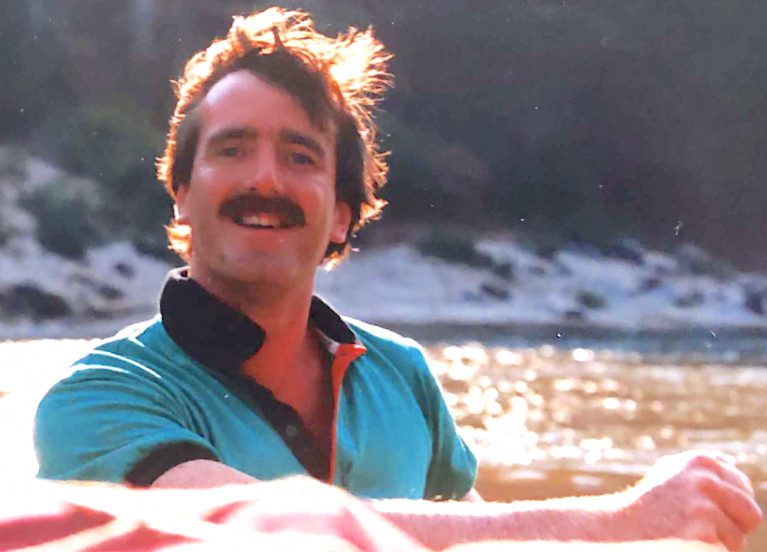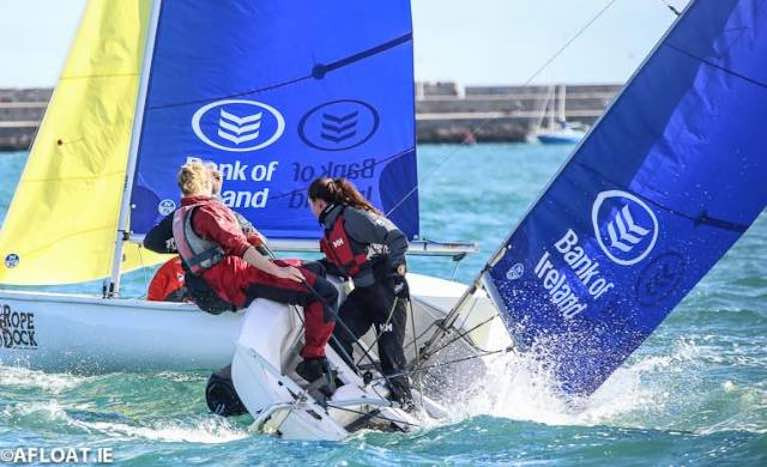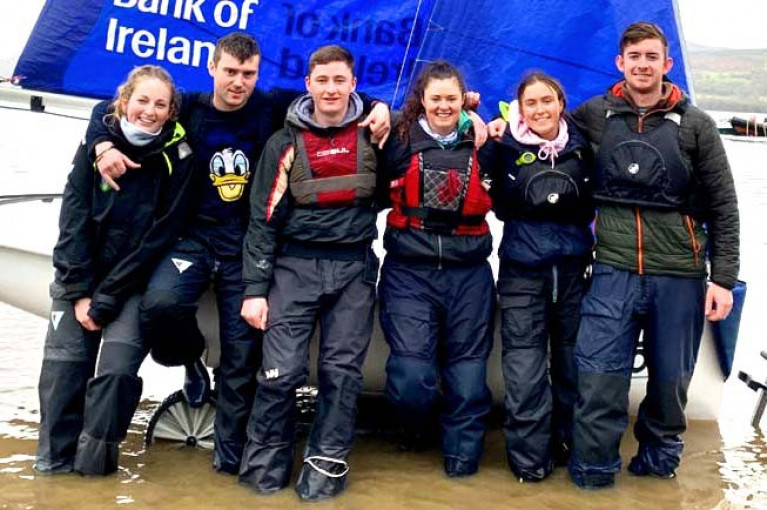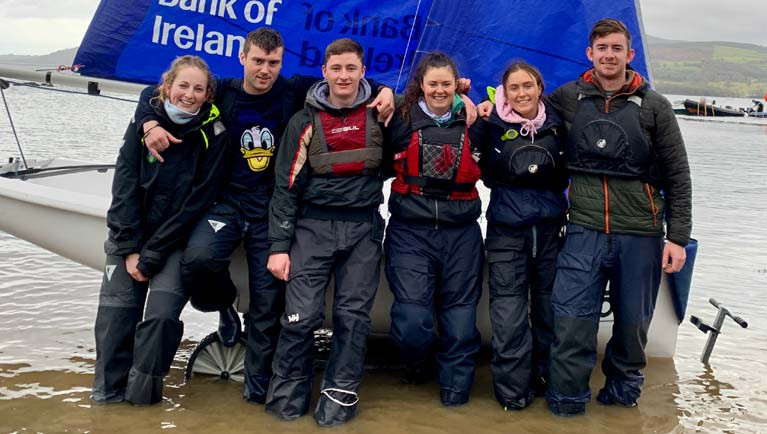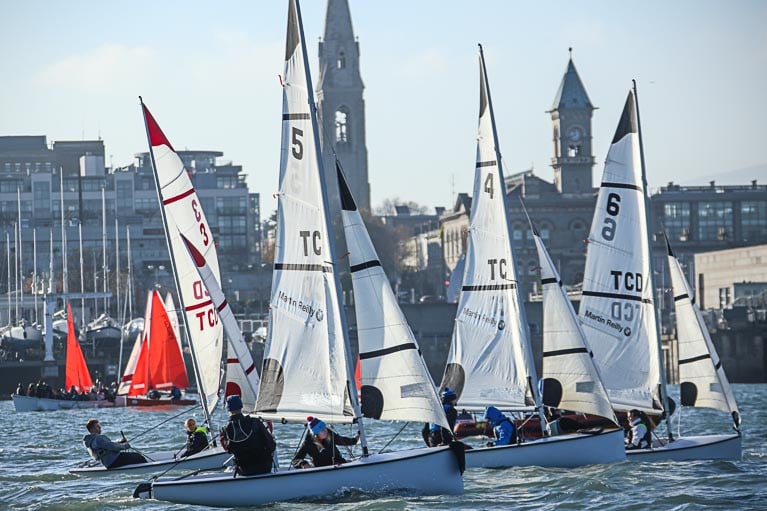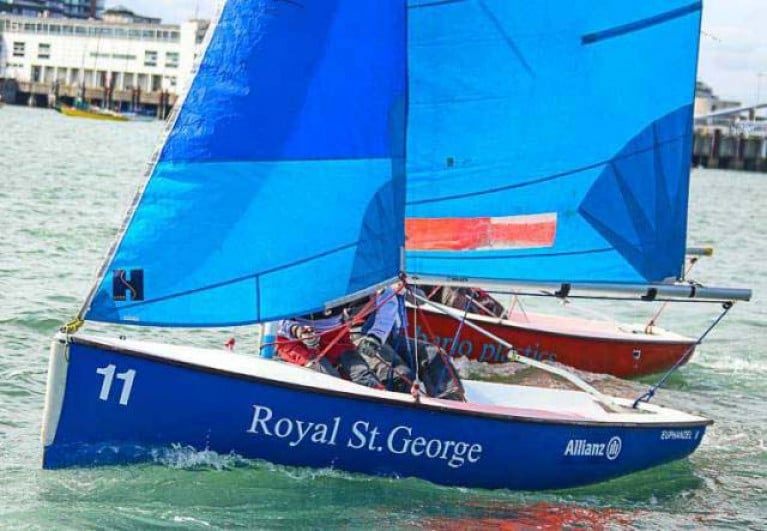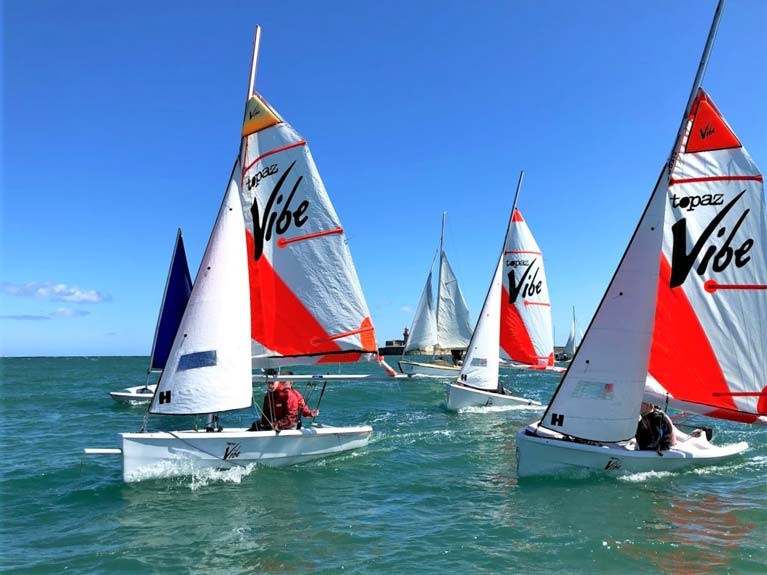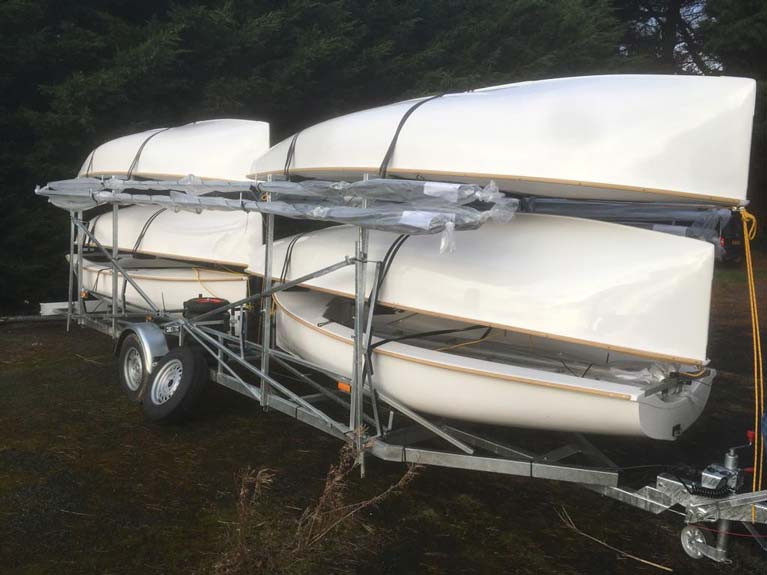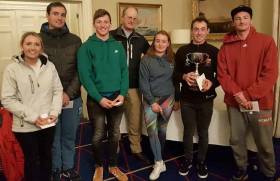Displaying items by tag: Team Racing
The Royal Saint George Yacht Club welcomes youth team racers from around the country for its Elmo Trophy competition on August 28th and 29th in Dun Laoghaire Harbour on Dublin Bay.
The event will be sailed in three flights of Firefly dinghies, where teams of six crews will race each other in a round-robin format.
Download the Notice of Race below
Teams must consist of six members from the same club, school or dinghy association. At least two members must be aged 16 and under on 31st December 2021. All team members must be aged 19 or under on 31st December 2021 and still attending second level education in 2021 (i.e. the event is not aimed at University Students).
The home team will hope to defend the trophy won by 'Curious George' in 2019 when 130 races were sailed over the weekend.
This year will see some new entrants such as Glandore Harbour Yacht Club, who have been training in a fleet of Fireflies already this season.
 The Royal St. George's Elmo Trophy
The Royal St. George's Elmo Trophy
The unique format of the event looks to split teams into pools of equal standards to ensure close racing for all while allowing every pool to have a chance to qualify for the quarter-finals.
To be placed on the entry list, email John Sheehy – [email protected]
Download the Notice of Race below as PDF document
Jimmy Fitzpatrick 1957-2021
One of Dublin Bay's great sailing characters Jimmy Fitzpatrick of the Royal Irish Yacht Club has sadly passed away.
A true corinthian of sailing Jimmy Fitz was very well known both here and abroad. While he sailed out of the Royal Irish, he could be spotted most seasons holding court on the balconies of all the waterfront clubs. He was on first-name terms with everyone. All who met or sailed with Jimmy would agree that a friendlier, considerate or more entertaining companion was hard to find. He had a deep raucous laugh that was not easily missed.
In honour of Jimmy's life, the flags of each of the Royal Irish Yacht Club, the Royal St. George Yacht Club and the National Yacht Club were flown at half-mast on the day of his funeral last Thursday, January 28.
Like many, he was bitten by the bug when introduced to sailing at the age of seven by his brother Richard. Jimmy later became a head instructor with the Royal Irish and the Royal St George and also instructed in the National Yacht Club alongside current Dublin Bay Sailing Club Commodore Ann Kirwan.
He attended the 50th-anniversary dinner of the N.Y.C. junior section organised by Carmel Winkelmann, where many stories of regattas in Mount Shannon and Rosslare were regaled. Jimmy was very much the Rodney Marsh of sailing, moments of brilliance on the water while partying hard onshore. He knew what it was like to cross the line first in a Dragon Gold Cup race. Win a Wednesday night Wag race. In the Fireball Nationals in Sligo in the early 80s, he beat Adrian and Maeve Bell to a race gun.
 Jimmy Fitzpatrick at the helm of his Fireball on Dublin Bay (with Michael Blaney on the wire) in the 1980s
Jimmy Fitzpatrick at the helm of his Fireball on Dublin Bay (with Michael Blaney on the wire) in the 1980s
At the time the Bells were in the top three in the world, on crossing the line Jimmy jumped overboard to celebrate and later that night the husband and wife duo magnanimously presented Jimmy and crew Mick Blaney with a bottle of Champagne. Years later, Jimmy and Mick nearly divorced when Jimmy simultaneously put the mast through the floor of the boat and his dad's garage roof in a late post regatta parking manoeuvre. Jimmy co-skippered alongside Mark Mansfield, a boat sponsored by his employers AIB in the 1988 Round Ireland Race. In 2004, Jimmy's nephew Rory represented Ireland at the Olympics in Greece. Jimmy worked hard behind the scenes to help Rory gather funds for the campaign to get him qualified.
It was when Jimmy got to UCD that his real passion in sailing developed; it was Team Racing. Jimmy competed in hundreds of team racing events over the years. He won the colours match for U.C.D. three years in a row setting the platform for the Rhinos (Spike, Joe Blaney & Marto Byrne) to go win it for another three years after that. In the '80s Jimmy moved to London and his flat became a focal point for not only Irish team racers but all the UK teams. He guest-helmed for the Nottingham Outlaws at the Illingworth trophy organised by HMRN. At the time the Outlaws were one of the top teams in the UK He set up his own team of sailors based in London and called them the Wild Geese. It was never clear what the criteria for qualification were but an ability to party was essential. Jimmy even managed to get a few West Kirby sailors to sail with the Wild Geese when short on numbers.
While competing at the Wilson Trophy one year, West Kirby had decided to try something different and hired a top sports commentator from Radio Liverpool to do some commentary on the team racing on the lake. They even installed a stand beside the caravan where the commentator was based. After a few hours, not even one man and his dog was watching or listening to what was unfolding and to make matters worse, the poor commentator knew nothing about sailing. Toll Smith a grandee of WKSC saddled up to Jimmy who was holding court in the wet bar and asked if he would mind spending a few minutes with the commentator to give him a few pointers on the sport. After a short conversation, the commentator from Liverpool Radio suggested to Jimmy he has a go at commentating on the next race. He passed the microphone to Jimmy and as they say the rest is history. Four hours later, Jimmy emerged from the caravan to a standing ovation from a full stand and a big crowd all around the lake. Jimmy later went on to commentate on the team racing worlds held in the Royal St.George, on the Sydney Olympics with RTE and was also invited to commentate with Sky Sports on a fledging International 14ft circuit.
Team racing appealed to Jimmy because he loved the camaraderie and people loved being in his company. He was very involved in the hearings on whether Commercial Cruise Ships should be allowed enter Dun Laoghaire Harbour. In the last decade, Jimmy struggled with his mental health, and many in the sailing community did their best to help him through difficult times.
 Jimmy Fitzpatrick (third from right) sailing on Mick Blaney's (standing) 31.7 in the 2019 Volvo Dun Laoghaire Regatta Photo: Afloat
Jimmy Fitzpatrick (third from right) sailing on Mick Blaney's (standing) 31.7 in the 2019 Volvo Dun Laoghaire Regatta Photo: Afloat
Jimmy still managed to compete with Mick Blaney on his Beneteau 31.7 right up till racing was cancelled last July. Despite the pressures, he was going through his ability to spot a wind shift never left him. Jimmy would have been the first to point out that when we sail, we always take precautions for our own safety and that of our crew. So onshore let's not forget to take care of our mental safety and that of our friends.
 Jimmy Fitzpatrick in his role as race officer for the Water Wags on Lough Boderg
Jimmy Fitzpatrick in his role as race officer for the Water Wags on Lough Boderg
Team racing and Dublin Bay will be the poorer for the loss of the unbridled enthusiasm of Jimmy Fitz. He only had one speed, and that was full-on.
Fair winds my friend.
DS
More photo memories of Jimmy have been provided by his friends and family here
Royal St George Yacht Club Cancels Elmo Trophy Team Racing Event at Dun Laoghaire Harbour
The 2020 Elmo trophy for team racing at Dun Laoghaire Harbour has been cancelled. With the current measures in place to halt the spread of the coronavirus event organisers RStGYC have made the difficult decision to cancel the event for 2020.
Unlike conventional fleet racing regattas, the Elmo Trophy sees groups of young sailors sharing Firefly dinghies, carrying out on-water changeovers using support RIBs and often being in close proximity to one another ashore.
It also requires a high number of support staff and volunteers, as well as attracting a large number of spectators to the club.
A postponement to October and a change in format to 2v2 Team racing was considered to enable the event to be sailed but with the recent rise in cases, the event has now had to be cancelled.
This year's event was to have seen the addition of the new ISA fleet of fireflies and the introduction of a Swiss league to ensure teams on similar standards continued to race against each other all weekend. Both of these would have helped build on last year's record entry of 22 teams and 4 flights of boats.
RStGYC looks forward to welcoming teams back in 2021.
It may seem like another world now, but the energetically-organised Irish Inter-varsities team racers managed to get in their 2020 Championship early in March before the Covid-19 clampdown closed in. The venue was University of Limerick’s watersports facility at Killaloe on Lough Derg, and in three decidedly hectic days of Firefly racing, University College Dublin Firsts emerged as overall winners. Their Sailing Captain is Daniel Raymond, so he gets the nod as our Team Racer of the Month, but it’s all about team effort, and the complete lineup was Jack Higgins, Daniel Raymond and Patrick Cahill as helms, while crews were Alanna Lyttle, Kathy Kelly and Lucy McCutcheon, with Lucy McCutcheon (winner in 2019) taking the Irish Universities Sailing Association “Crew of the Year” title
UCD Sailing Club Win 2020 Team Racing Intervarsities
UCD Sailing Club has won the Irish University Sailing Association (IUSA) Team Racing Intervarsities 2020.
They came out on top after three tough days racing at UL Adventure Centre, Killaloe. Following three extremely competitive finals, UCD Sailing managed to take home not only Platinum Fleet (UCD 1) but also Gold (UCD 3) & Silver Fleet (UCD 5).
The UCD 1st's consisted of the helms Jack Higgins, Sailing Captain Daniel Raymond, Patrick Cahill and crews Alanna Lyttle, Kathy Kelly and Lucy McCutcheon. Lucy was also awarded IUSA crew of the year!
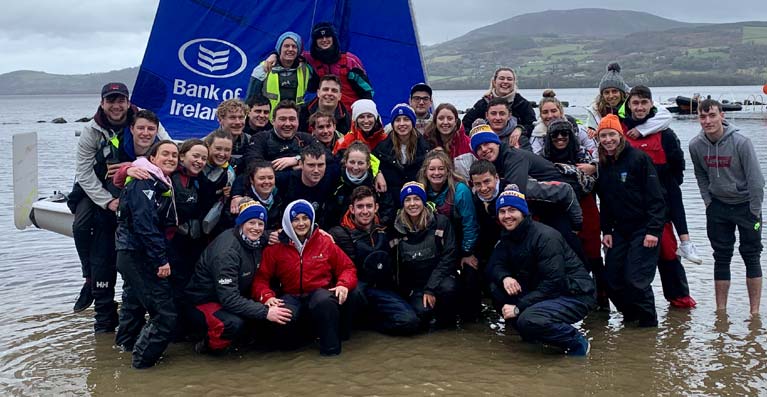 Intervarsity sailors at UL in Killaloe on Lough Derg
Intervarsity sailors at UL in Killaloe on Lough Derg
UCD Sailing has now qualified for BUSA Team Racing National Championships in England for the second year in a row.
Niamh Doran the Commodore, Shaun Condon the varsities captain and UCDSC’s committee organised the fantastic few days with top quality racing and were pleased to see the turnout of over 250 competitors.
The next event is UCD Vs Trinity Colours match and will be held in the 4th of April. They would like to thank their sponsors Bank of Ireland.
Irish Sailing Team Racing Weekend Scheduled for Howth
Howth Yacht Club will welcome the Irish Sailing team racing roadshow funded by BIM - Bord Iascaigh Mhara - (Ireland's Seafood Development Agency) which is designed to attract sailors between the ages of 14 – 30 from around the area, it is not just for members of HYC.
The Roadshow will start at 10 am on Saturday 7th March and run for two days. Team Racing is a fun and inexpensive way for clubs to attract young dinghy sailors after they have left the structured environs of class youth racing or the Irish Sailing Training Schemes. All boats and instructors will be there on the day, all sailors have to do is turn up in their winter sailing gear. Given the time of year, we would advise that sailors have sufficient dinghy sailing competency to cope with reasonable winds and colder climes. With a focus on rules knowledge, boat handling, tactics and team building, the programme will further develop transferable skills and give rise to skilled and competitive racing in a very sociable environment. Participants have the option of doing both days or just one day if they prefer and the cost is €30 for one day or €50 for both. See the event flyer here for more details.
This initiative came from active Howth Yacht Club member, Darragh O'Connor who teaches in Sutton Park School and is heavily involved in sailing himself. Darragh first started team racing in Schull community college which he says hugely benefited him in his college sailing days and he was hooked, not only by the competitive but fun racing but also by the great social side attached to the events. This event is the first of what is hoped to be many new sailing initiatives which will be run by Howth Yacht Club this season, all with the aim of making sailing in the club more accessible to all ages and levels.
For more information regarding the event please contact Christina Knowles [email protected] or to book your space you can phone the office in HYC at 01-8322141.
Royal St. George Yacht Club Hosts Leinster Team Racing (UPDATED)
Update Saturday 14 March: Due to the evolving situation with the COVID-19 Virus and that all schools are currently closed, this event is postponed for this term.
Royal St George sailing manager Ronan Adams says: “Discussions are ongoing as to when the Leinster Championships and National Championships will take place and the Irish Team Racing Association will update all school representatives as soon as is reasonably possible.”
Dun Laoghaire's Royal Saint George Yacht Club is once again hosting the Leinster Schools Team Racing event on Wednesday the 11th of March.
The event is open to all schools in the Province of Leinster. In the event of bad weather, there is a fall back date for the 25th of March.
As Afloat reported in 2019, Gonzaga College were Leinster Championship victors after eight teams competed in Firefly dinghies for the title in mostly light airs in Dun Laoghaire harbour.
The Royal St. George leads the way in Irish Team Racing affairs with Junior, Schools, Youth and Adult Team Racing squads training and competing locally, nationally and internationally from the club. Queries can be made to Eunice Kennedy, Leinster Schools Team Racing Representative at the following email:- [email protected]
Shanahan Cup Leads Team Racing Calendar of Events in 2020
Representatives from clubs, schools and centres have been working tirelessly throughout the winter to develop a calendar of events for Team Racing throughout Ireland. The first schools’ event is to be held on 12th February where teams from around the country will compete in the hotly contested Shanahan Cup. Now in its second year, the team racing event is growing in popularity amongst local schools. Organised by Gonzaga College and hosted at the Irish National Sailing and Powerboating School the event will be sailed in Topaz’s in Dun Laoghaire Harbour.
The Inaugural event won by Gonzaga College in 2019 is sponsored by the Shanahan family from the National Yacht Club. The family have a long sailing history and a close association with Gonzaga College, the organising school. The event is intended to promote the sport of team racing in schools. It particularly aims to attract less experienced sailors with all schools encouraged to “give it a go” as Fiachra Etchingham – Event Organiser suggests; “We had 9 teams from 6 Dublin schools and 54 competitors braving the cooler weather last year which is a great turnout for any inaugural event. We hope to build on that this year and have had interest from some of the North Dublin schools as well. It was great to see some recently formed teams at the last event just getting started in team racing. It’s important that we continue to increase participation in such a fun and social sport.”
Indeed, the first event welcomed participants from Holy Child, Blackrock College, Loreto on the Green, Gonzaga College, St Gerard's and Loreto Foxrock. However, interest in Team Racing is increasing as Rory Martin – Irish Sailing’s Team Racing contractor highlights “Irish Sailing is rolling out the BIM FLAG (Bord Iascaigh Mhara) funded Team Racing Roadshow where clubs, centres and schools can avail of free Team Racing coaching. With interest from 37 venues to date, interest is building nationwide. We have spoken to several local schools and hope to get some more programmes delivered in the coming weeks as a lead up to the event.”
Dublin Bay is often considered the home of Team Racing in Ireland. With many of the local clubs and training centres purchasing boats and organising training courses and events. The family-run Irish National Sailing and Powerboat School welcomes 8000 participants per year on training courses and is delighted to be hosting the event as Kenneth Rumball – Chief Instructor explains;
“We offer the ideal venue for Team Racing with all the equipment, support and facilities to run a successful event. Last year the kids enjoyed the great racing on the water and the social in between races on our Mothership the ‘Lula Belle’. We’ll be offering Hot Chocolate and tasty treats to all competitors and have enlisted the help of a great race team including umpires, race officer and volunteers”
The event is the first in the calendar of schools’ events in 2020. Provisional dates for The Leinster and National Schools Team Racing Championships were released for March and April respectively.
New Fleet of Firefly Team Racing Dinghies for Irish Sailing
With an increased in demand for Team Racing amongst clubs and training centres, Irish Sailing are delighted to receive their brand-new fleet of six Fireflies writes Treasa Cox.
The boats were partly funded by BIM FLAG (Bord Iascaigh Mhara, Fisheries Local Action Group) as part of the Irish Sailing Team Racing Development Programme.
The boats are part of the Irish Sailing Team Racing Roadshow and will be made available for clubs to hire at a heavily discounted rate to cover transport, damage and upkeep. With a 6- stacker trailer, distinctive sail colour scheme and upgraded rudder assembly, the boats are robust, attractive and transportable.
"The boats are part of the Irish Sailing Team Racing Roadshow"
Rory Martin, Irish Sailing’s Team Racing contractor commented “with several clinics provided to date and interest building nationwide, we are really looking forward to getting out and delivering the workshops with the new fleet. Whilst many clubs have their own training boats, the Fireflies enable those that don’t to avail of the programme with this top-class equipment. Our experienced team racing coaches make the clinics interesting, fun and informative and they are receiving great feedback. The boats have been highly spec’d and look really cool with green and gold striped sails, so should be pretty noticeable from the shore.”
Bookings are coming in already for 2020. With over thirty clubs interested throughout the country, it is likely that availability during weekends and holidays will book up quickly. To find out how your club or training centre can get involved, or to express an interest in sponsorship, get in touch with Rory Martin [email protected]
Mark Hassett is Sailor of the Month (Team Racing) for November 2019
The 71st annual National Team Racing Championship hosted by Royal St George YC in the mid-November weekend attracted 16 squads from all over Ireland, and it was one of the furthest-travelled teams - Baltimore Sailing Club - which went home with the honours after a convincing 3-0 win in the finals against a hyper-talented squad – including an Olympic sailor – which sailed under the moniker of Fast Not Furious. Ably led by West Cork-based sailor Mark Hassett, Baltimore kept their cool against everything that the rest of Ireland and particularly Leinster could throw at them, and Captain Mark Hassett carries the “Sailor of the Month” honour on behalf of his team-mates Fionnn Lyden, Johnny Durcan, Amy Harrington, Trudy O’Hara and Adam Hyland.



























